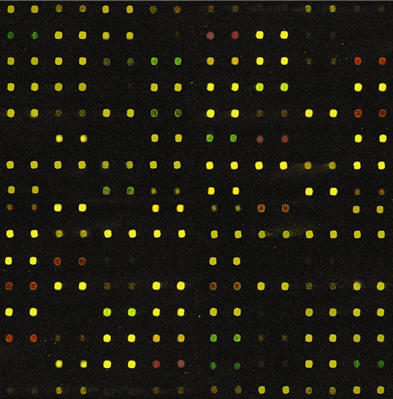Biomarkers of TBI
| Select a project below to learn more: |
|
| Mechanisms Underlying Working Memory |
|
 Brain trauma pathophysiology can be roughly divided into two phases: a primary phase in which physical damage to the brain is caused by mechanical forces at the time of injury, and a secondary phase in which alterations in brain chemistry contribute to outcome. Increases in intracranial pressure (ICP) are secondary injury processes that can greatly influence outcome. Although the causes of increased ICP can vary, the pathophysical consequences including decreased cerebral perfusion and secondary ischemia are common. While the progression of ICP elevations can be monitored, there is no definitive diagnostic test available to determine the probability of a subsequent rise in ICP. Using serum samples taken from brain injured patients and healthy volunteers, we are using proteomic techniques (e.g. mass spectrometry, multi-plex arrays, 2-D gel analysis) to identify those markers that have prognostic value in determining which TBI patients are at risk for developing elevated ICP. The identification of these biomarkers, or a combination of biomarkers (a biomarker signature) will not only have diagnostic value, but will lead to new avenues for studying the mechanisms underlying elevated ICP.
Brain trauma pathophysiology can be roughly divided into two phases: a primary phase in which physical damage to the brain is caused by mechanical forces at the time of injury, and a secondary phase in which alterations in brain chemistry contribute to outcome. Increases in intracranial pressure (ICP) are secondary injury processes that can greatly influence outcome. Although the causes of increased ICP can vary, the pathophysical consequences including decreased cerebral perfusion and secondary ischemia are common. While the progression of ICP elevations can be monitored, there is no definitive diagnostic test available to determine the probability of a subsequent rise in ICP. Using serum samples taken from brain injured patients and healthy volunteers, we are using proteomic techniques (e.g. mass spectrometry, multi-plex arrays, 2-D gel analysis) to identify those markers that have prognostic value in determining which TBI patients are at risk for developing elevated ICP. The identification of these biomarkers, or a combination of biomarkers (a biomarker signature) will not only have diagnostic value, but will lead to new avenues for studying the mechanisms underlying elevated ICP.
